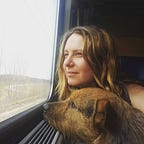Learnings and Reflections from the First Post Growth Fellowship
What happened when 24 post-growth activists, researchers, artists, and entrepreneurs from across the world joined a year-long content & community-building collaboration.
Launched in September 2021, the world’s first Post Growth Fellowship brought together 24 post-growth activists, researchers, artists, and entrepreneurs from a range of backgrounds, fields, cultures, histories, and geographies for a 12-month content and community-building collaboration. Here, the Post Growth Institute’s Fellowship support team, alongside the Fellows themselves, reflect on the rich and diverse learnings from the inspiring inaugural year.
Nurturing the individual in a collectivist framework
One of the most surprising and interesting realizations from this Fellowship is that post growth research and activism can feel isolating — even for those working in organizations or as part of other fellowships. Having spaces to connect in vulnerable ways to share the loneliness of that journey is powerful .
Relatedly, we note the importance of nurturing individuals. Just because the answer to our individualistic tendencies in capitalism is collectivist action, it does not mean that the only antidote is to create collectivist practices. People are often burned out, so it’s essential to instead individually nurture and support leaders around the world in their collectivist work, in a collective community.
Through this Fellowship we have seen that people have concrete needs which, when met, can make their work easier and more fruitful. The Offers and Needs process — just that simple focus on matching and resourcing — can be transformative. One Fellow, for example, was able to provide digital marketing consultancy for another’s fledgling social enterprise, and numerous in-person connections were made as Fellows offered each other accommodation in their hometowns.
The importance of supportive curation
Fellows deeply appreciated being supported in telling their stories — whether through editorial collaboration, interviews, or simply open conversation. Rather than having their voices mediated and sculpted to fit around a predetermined agenda, content creation and sharing was led by the Fellows themselves. This led to the emergence of authentic, insightful articles and videos told from diverse perspectives, and ensured that Fellows always retained control of their stories.
As one Fellow shared during an engagement call:
The blog post you wrote [based on our interview] has been awesome. I can’t tell you how many times I have sent it to people. And when people saw it, they got excited and contacted me. I really appreciate it.
‘Post growth’ speaks for itself
Fascinatingly, we did not define ‘post growth’ at the outset of the Fellowship, yet this did not create barriers to participation. We were able to validate that a group of people from all over the world, working on disparate topics and fields, can come together under the guise of ‘post growth’ and feel comfortable in the shared understanding of its overarching significance. What’s more, over the course of the year, some Fellows have begun to use the term explicitly in their work. This highlights the necessity for fluidity of language when dealing with cross cultural explorations of sustainable futures.
This learning is particularly pertinent to regions beyond the Global North, from which the majority of post growth discourse emerges and on which it focuses. While their work is not always labeled ‘post growth’, Fellows in the Global South have long been exploring alternative economics outside capitalist, growth-based frameworks yet often aren’t recognized — and these approaches often connect with traditional Indigenous perspectives, as well as those of community development workers.
Getting into relationship
Starting out without fixed definitions set the tone for a culture of openness to learning — and, in turn, reduced the potential for tension and conflict. From this place of trust, people felt calm and safe enough to explore, to question, and at times to disagree in a healthy, non-confrontational way that allowed for the emergence of insight and potential new pathways.
Robert Wanalo, our Director of Movement Building, was also one of the Fellows, providing invaluable ongoing advice based on his experiences. Robert requested from the very beginning that we focus on relationship building, first of all with each other as a team. And, once the team got to know each other and felt comfortable as a collective, we began nurturing connections with individual Fellows, and then modeled that focus so that Fellows could build relationships with each other. This happened through regular engagement calls that took the form of Offers and Needs Markets, Warm Data methodologies, and networking breakout sessions. In other words, we spent time making sure that the Fellowship did not feel transactional.
At the same time, in acknowledgement that many fellowships can feel extractive, we decided to lower the bar and reduce the content requirement to just one piece per Fellow for the entire year. At some point we realized that the greater purpose of the Post Growth Fellowship is how we can give to and support Fellows — so that they, in turn, can continue and deepen their groundbreaking work.
Three things you can do if you found this article inspiring:
- Republish any of the Fellowship articles or videos on your own blog, website, publication, or platform. All of our content is published under a Creative Commons license.
- Join the Post Growth Institute’s cooperative social media service to help promote the Fellowship, as well as lots of other post-growth aligned content and organizations. You’ll receive email alerts when articles are shared on social media.
- Chip in $US20 to help us convene the 2023 Fellowship.
